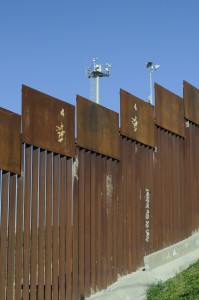 Today, the U.S. Senators charged with developing the new immigration legislation released a bipartison framework for Comprehensive Immigration Reform. The leadership group, nicknamed the “Gang of 8,” includes Senators Charles Schumer (D-NY), John McCain (R-AZ) Dick Durbin (D-IL), Lindsey Graham (R-SC), Robert Menendez (D-NY), Mark Rubio (R-FL), Michael Bennet (D-CO), and Jeff Flake (R-AZ).
Today, the U.S. Senators charged with developing the new immigration legislation released a bipartison framework for Comprehensive Immigration Reform. The leadership group, nicknamed the “Gang of 8,” includes Senators Charles Schumer (D-NY), John McCain (R-AZ) Dick Durbin (D-IL), Lindsey Graham (R-SC), Robert Menendez (D-NY), Mark Rubio (R-FL), Michael Bennet (D-CO), and Jeff Flake (R-AZ).
The framework. made available online by the American Immigration Lawyers Association, holds much promise for a path to citizenship for the eleven million people currently living in the shadows without documentation in the United States. Yet, many problems remain to be addressed. While the second pillar cites the importance of strenghtening American families, the framework fails to offer a solution to keep LGBT families together, a coalition of LGBT groups pointed out in a public response.
The framework promises to generate discussion about LGBT families and many other issues “The gang’s plan is the beginning, not the end, of the discussion on immigration reform,” noted Joanne Lin, ACLU legislative counsel.
The lack of transparency and accountability within the border patrol is another issue that border communities will press for. Just last month, Customs and Border Protection launched a review of its officers’s use of force, in response to years of criticism and protests from border communities, members of the U.S. Congress, officials in the Mexican government and over 115 faith and non-governmental organizations.
Since 2010, sixteen people have been killed in fatal confrontations with the border patrol, prompting unprecendented scrutiny of the federal agency. The Southern Border Communities Coalition released a statement today noting that any framework making comprehensive immgration reform contingent upon border enforcement must include mechanisms to hold our federal officers accountable for the decisions they make.
Here’s the full statement by the Southern Border Communities Coalition:
Southern Border Region: We are pleased to see that the framework proposed by the bipartisan group of Senators includes a pathway to citizenship. However, this pathway to citizenship should be contingent on creating a better border and should not be burdened by unnecessary border enforcement.A better border is efficient, humane, and a cornerstone of economic prosperity for all. The Senators’ proposal begins to outline what a better border looks like by “strengthen[ing] prohibitions against racial profiling and inappropriate use of force, enhanc[ing] the training of border patrol agents, increas[ing] oversight, and creat[ing] a mechanism to ensure a meaningful opportunity for border communities to share input, including critiques.”“Rather than continuing years of wasteful spending, the Congress and the Administration must begin holding border enforcement agencies accountable for their bloated budgets, flawed policies, and abuses of human and civil rights,” said Christian Ramírez, director of the Southern Border Communities Coalition.“Border enforcement policy decisions must include mechanisms that holds agencies accountable and provides oversight as well as reflecting the perspectives of border communities,” says Vicki Gaubeca, co-chair of the Southern Border Communities Coalition and director of ACLU of New Mexico Regional Center for Border Rights.She continues, “Now is the time to halt further construction of costly, deadly and ineffective border infrastructure or unproven technologies, and stopping the expensive, overzealous prosecution of migrants through programs like Operation Streamline.” This operation is a “zero tolerance” border enforcement program that orders federal criminal charges for every person who crosses the border without documentation, overloading U.S. courts and undermining the best values of our judicial system.Due to the focus on border enforcement, U.S. ports of entry have been neglected, turning them into bottlenecks for travelers causing wait times to reach as long as five hours. If ports of entry continue to be neglected, the U.S. Commerce Department projects that the average time to get through these ports to enter the United States will continue to rise, resulting in a delay the Department estimates could cost a total of $12 billion by 2017. We want better ports of entry.
In a live press conference today covering the principles introduced by the bipartisan group of Senators, New York Senator Schumer said he does not want immigration reform to be a wedge issue, yet a border enforcement component is precisely a wedge issue that falls short of addressing the realities of the border region.The Border Patrol is out of control. Incidents of excessive use of force are on the rise, with at least 20 people killed and 3 seriously injured by CBP officials since January 2010. There is little accountability and oversight on the part of CBP for these systemic abuses.Border Patrol’s use-of-force incidents have attracted international scrutiny with the government of Mexico, the Inter-American Commission on Human Rights, and the Office of the United Nations High Commissioner for Human Rights weighing in to urge the U.S. government to investigate CBP’s involvement in each fatality.“Policymakers must break away from the shortsightedness of border enforcement and view the border in its entirety, as the home to 6 million people, as a cornerstone of the US economy, and as a vibrant corridor for millions of travelers and shoppers,” says Andrea Guerrero, Executive Director of Alliance San Diego and Co-Chair of the Southern Border Communities Coalition. “A better border is needed to go hand in hand with immigration reform.”If you have questions, please contact: Ricardo Favela, (760) 659-3620
And, for the sake of a better border, and a better America, let’s hope that this framework does indeed provide the occasion for substantive discussion of civil and human rights for all.
